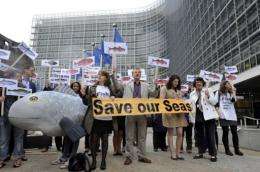People demonstrate in 2011 in front of EU headquarters in Brussels in favor of restoring fish stocks. An ambitious reform of Europe's fishing sector to help replenish shrinking fish stocks appears likely to be watered down substantially by European Union nations, diplomats said Friday
An ambitious reform of Europe's fishing sector to help replenish shrinking fish stocks appears likely to be watered down substantially by European Union nations, diplomats said Friday.
Sources said ministers from the 27 EU nations meeting in Luxembourg on Tuesday were headed to reach a much-diluted compromise on proposals for far-reaching reform drafted by Europe's Fisheries Commissioner Maria Damanaki.
She has repeatedly called for "a real break with past practices" but diplomats who asked to remain anonymous said the ministers were unlikely to meet her targets at the talks.
The reforms are to come into force in 2014 after approval by the European parliament.
Due to the depletion of fish stocks, boats are forced to sail further and further afield to cast nets and Damanaki had argued strongly for the end to the status quo.
According to a European Commission report this week, 80 percent of fish in the Mediterranean are over-fished though the situation is improving in Atlantic waters where overfished stocks have dropped from 94 percent in 2005 to 47 percent this year.
A key plank in Damanaki's proposals was to convince EU ministers on June 12 to introduce "transferable fishing concessions" to fish certain stock, and enable those quotas to be traded privately at a national level.
That was seen as a way of making fishermen more responsible about the sustainability of ocean life and of encouraging small players to quit the industry.
Similar systems of concessions have enabled Denmark to reduce its fleet by 30 percent in four years and have kept the fishing sector healthy in countries such as Australia, New Zealand and Norway, she has said.
But diplomats told AFP that a compromise solution being circulated would be to give countries a free choice on whether to adopt the system.
A goal to replenish fish stocks by 2015 too has been watered down with a "calendar that is becoming widely accepted saying 2015 if possible, but 2020 at the latest."
"If it's business as usual, in 10 years only eight out of 136 stocks will be healthy," the commissioner told AFP last year.
"I'm not an environmentalist, I'm not a fisherman, my job is to find a balance so that we can fish in the future, so our children will have fish."
Another, and possibly the most controversial of her ideas, was to end the practice of throwing fish caught by accident back into the sea -- a practice known as discards.
Brussels wanted fishermen to bring all catches to port and deduct discards from quotas -- while turning them into fish flour -- so as to encourage fishermen to adopt better practices.
But one diplomat said Belgium, France, Spain and Portugal were likely to oppose the idea which is highly unpopular with boats that go out to sea for days at a time.
Leaks on the compromise agreement expected at next week's talks outraged several environmental lobby groups on Friday.
Should the 27 ministers agree to the compromise they will "settle for a European fisheries policy of the lowest common denominator, without any ambition to achieve sustainable fisheries or save fishing jobs," said six NGOs -- BirdLife Europe, Greenpeace, Oceana, Ocean2012, Seas At Risk and WWF.
"The proposed deal would not stop the depletion of fish stocks for another decade," they said. Yet a US fisheries policy overhaul "has demonstrated that it is possible to achieve the recovery of fish stocks within a limited period."
(c) 2012 AFP




















